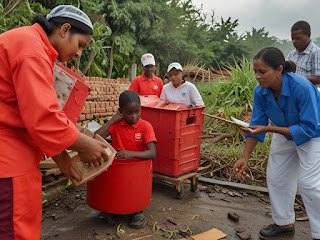The Role of Social Work in Disaster Relief
In times of disaster, communities face unprecedented challenges that extend far beyond the immediate physical damage. Natural disasters, such as hurricanes, earthquakes, and floods, as well as human-made crises, can devastate lives and infrastructure, leaving lasting impacts on individuals and society. In these critical moments, social workers play a vital role in disaster relief efforts, embodying core principles of their profession to provide crucial support and facilitate recovery.
Immediate Support: First Responders of Emotional and Practical Aid
When disaster strikes, social workers are often among the first professionals on the scene, working alongside emergency services to address the immediate needs of affected individuals and communities. Their training in crisis intervention and trauma-informed care allows them to:
- Provide psychological first aid to survivors, helping to stabilize emotions and prevent acute stress from developing into long-term mental health issues.
- Assist in reuniting families and locating missing persons.
- Connect individuals with essential resources such as food, shelter, and medical care.
- Help coordinate relief efforts by assessing needs and directing resources efficiently.
Social workers' ability to rapidly assess situations and provide empathetic, person-centered support makes them invaluable in the chaotic aftermath of a disaster.
Long-Term Recovery Planning: Building Resilience and Restoring Communities
As the immediate crisis subsides, social workers transition into long-term recovery roles, focusing on rebuilding lives and communities. Their involvement in this phase is critical and multifaceted:
- Case management: Social workers help individuals and families navigate the complex web of recovery services, insurance claims, and government assistance programs.
- Mental health support: They provide ongoing counseling and therapy to address trauma, grief, and stress-related disorders that often emerge in the wake of disasters.
- Community organizing: Social workers facilitate community meetings and initiatives to empower residents in the rebuilding process, ensuring that recovery efforts align with local needs and values.
- Capacity building: They work to strengthen local support systems and social networks, enhancing community resilience for future crises.
By taking a holistic approach to recovery, social workers help ensure that communities not only rebuild but emerge stronger and more prepared for future challenges.
Advocacy: Giving Voice to the Vulnerable and Shaping Policy
A crucial aspect of social work in disaster relief is advocacy. Social workers use their firsthand experiences and professional insights to:
- Highlight the needs of marginalized and vulnerable populations who are often disproportionately affected by disasters.
- Push for equitable distribution of resources and services during relief efforts.
- Advocate for policy changes to improve disaster preparedness, response, and recovery systems.
- Raise awareness about the long-term impacts of disasters on mental health and social structures.
Through their advocacy efforts, social workers help shape more effective and inclusive disaster relief policies and practices.
Embodying Core Principles
Throughout all phases of disaster relief, social workers embody core principles of their profession:
- Human dignity and worth: Treating each individual with respect and promoting self-determination in recovery choices.
- Social justice: Ensuring fair and equitable access to resources and opportunities during relief efforts.
- Importance of human relationships: Leveraging and strengthening social connections to foster community resilience.
- Integrity: Maintaining ethical standards and professional boundaries in high-stress situations.
- Competence: Continuously updating skills and knowledge to provide the most effective interventions in disaster contexts.
Conclusion
The role of social work in disaster relief is indispensable. From providing immediate emotional support to planning long-term recovery and advocating for systemic improvements, social workers are at the forefront of helping communities navigate the complex challenges posed by disasters. Their unique blend of skills, values, and perspectives makes them essential partners in building more resilient and equitable societies capable of withstanding and recovering from future crises.
As climate change increases the frequency and severity of natural disasters, and as social and political upheavals continue to create human-made crises, the importance of social workers in disaster relief will only grow. Recognizing and supporting their vital role is crucial for developing comprehensive, compassionate, and effective disaster response systems that truly meet the needs of affected communities.




Comments
Post a Comment